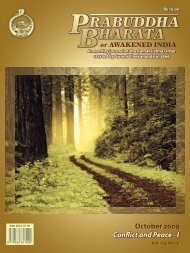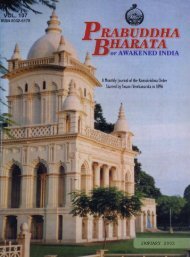October 2011 - Advaita Ashrama
October 2011 - Advaita Ashrama
October 2011 - Advaita Ashrama
Create successful ePaper yourself
Turn your PDF publications into a flip-book with our unique Google optimized e-Paper software.
A Study of Humankind:<br />
The Question of Consciousness<br />
Prof. S C Malik<br />
Dualistic and anthropocentric world<br />
views dominate the modern world.<br />
These world views can be summarized<br />
thus: (i) The universe is a machine, not an organism<br />
having consciousness; (ii) this universe is<br />
real to the extent that it can be externalized and<br />
quantified; (iii) the subjective internal nature<br />
of an individual is different from the external,<br />
which alone can be objectified; (iv) intelligence<br />
follows matter and the former must be explained<br />
in terms of the latter; (v) time and space are essentially<br />
uniform and are externally real and independent;<br />
(vi) human beings are considered<br />
to be essentially rational animals without any<br />
transpersonal spirit, without any basic hier archy<br />
of consciousness among them—and if at all there<br />
is, it is irrelevant to the understanding and organization<br />
of society—and though imperfect<br />
beings, humans are the measure of all things.<br />
Regarding human knowledge, these world<br />
views have the following characteristics:<br />
(i) There is a single truth, held by religion in<br />
the past and by scientific knowledge at present;<br />
(ii) the study of the subjective and the objective<br />
can be completely separated, without any need<br />
for first study ing the subjective; (iii) knowledge<br />
is an end in itself, and can also be applied for<br />
the betterment of humans and society; (iv) the<br />
only way by which knowledge can be obtained<br />
is reason and the measurements of scientific instruments;<br />
(v) true knowledge is obtained by<br />
proceeding from the particular to the general;<br />
(vi) it is necessary to detach oneself from the<br />
642<br />
object of study; (vii) reality is a mental construct,<br />
not a vision or experience of particulars;<br />
(viii) true knowledge is fundamentally quantitative,<br />
not qualitative; (ix) the truth and falsity<br />
of prop ositions is self-evident, irrespective of<br />
the person who states them; (x) the conclusions<br />
of faith and religion are not valid means for the<br />
acquisition of true knowledge.<br />
The above concepts have produced serious<br />
consequences, both theoretical and pragmatic,<br />
and have impacted humanity in various ways.<br />
The most damaging is the development of a survival<br />
mentality that has accentuated technoeconomic<br />
overgrowth, which has led to wars,<br />
tyranny, and pollution. In its rigidity, it has ignored<br />
mystical knowledge as well as human aesthetic<br />
values and has taken many persons away<br />
from the true foundations of religion, which<br />
are morality and unselfishness. Civilization and<br />
human life is becoming increasingly fragile and<br />
prone to fragmentation; the division between<br />
the sacred and the secular is becoming more pronounced,<br />
resulting in a psychological tendency<br />
towards angst, distrust, vulgarization, commercialization,<br />
and victimization.<br />
It is evident that we need to re-evaluate the<br />
very premises of life to thus find insights on how<br />
to act effectively and appropriately in the critical<br />
times our civilization faces today. Unfortunately,<br />
most policy-makers do not think there is a practicable<br />
solution, and as a result we are unable to<br />
bring about the required authentic qualitative,<br />
not mere quantitative, transformation. What is<br />
PB <strong>October</strong> <strong>2011</strong>

















